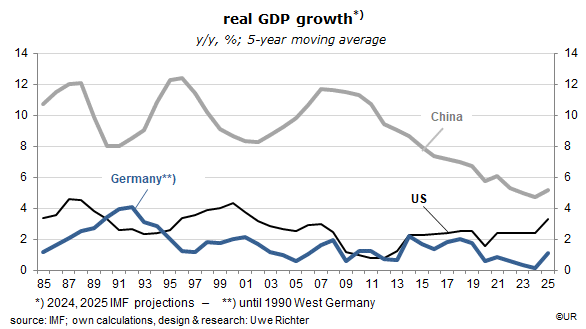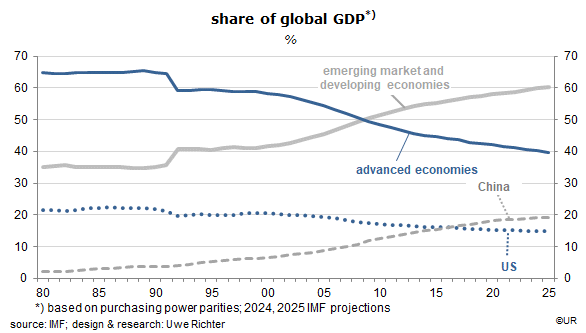
Market Commentary: How the IMF would boost economic growth
The central message of the IMF’s new World Economic Outlook is that the world’s real GDP will continue to grow in coming years, if not as briskly as in the decades before the pandemic – at annual rates of no less than 3.2%. Once again, the most dynamic part of the global economy will remain emerging market and developing economies which are expected to expand by 4.2% in both 2025 and 2026, only slightly less than in the recent past, while “advanced” countries will have to settle for rates of 1.8% in both years. Were it not for the dynamic US (on average 2½%) the outcome would be even more modest. The 2-year average for Western Europe will be just 1%, and 0.7% for Japan. And poor Germany? 0.4%

As the IMF admits, the risks to its outlook are tilted to the downside – the actual outcome may well be less than forecast. Let me remind readers at this point that organizations such as the IMF, the OECD or the European Commission have never anticipated a recession a year or more in advance. They are structurally too optimistic.
At the same time, inflation is lower than predicted, especially in rich countries where high real long term rates continue to restrain demand for goods and services. In the OECD-region inflation rates are mostly approaching central bank targets of 2%. Most monetary authorities have therefore begun to cut policy rates – the interest rate cycle has turned.
The IMF thinks that downside risks will increase in coming years and slow economic growth. The Fund lists regional conflicts in Eastern Europe, the Near East and China, another significant increase of commodity prices, counterproductive trade barriers, protectionist industrial policies (IRA!), sticking to overly restrictive monetary policies for too long, a pandemic or an abrupt end of the boom of overvalued equities and other assets. In general, countries are not well-prepared for such events.
To make them more resilient, the IMF proposes that they implement so-called policy triple pivots, a readjustment of strategies:
- As mentioned, monetary policies have eased – they have become less restrictive and are moving toward neutrality. This is important because labor markets in the OECD-region have begun to show signs of weakness. A dollar depreciation in the wake of falling policy rates in the US would greatly benefit emerging economies, especially with regard to their debt service. Supply shocks, triggered by a major war, another health crisis or overly ambitious climate policies, usually drive up inflation rates while real GDP growth gets hit. A major dilemma for economic policy makers.
- According to the IMF, fiscal policies have been overly expansionary in recent years (though not in Germany) which has reduced the room for anti-cyclical maneuvers. In the US and China, in particular, government plans to stimulate the economy do not bode well for future stability. It is a narrow path between the need to consolidate (ie, reduce deficits) and overly restrictive fiscal policies (which could lead to a recession). The IMF advocates a balanced approach. You wouldn’t have guessed.
- What to do about the general slowdown of economic growth? The IMF wishlist is well-known and long. I quote: “Economic growth must come … from ambitious domestic reforms that boost technology and innovation, improve competition and resource allocation, further economic integration and stimulate productive private investment.”
It is the task of national politics to accomplish all this. The problem is the transition from sensible plans to actions that really improve the situation. We probably have to wait for the next big crisis before rich countries awake from their slumber and get going, do the difficult things that are necessary to achieve higher growth rates again.

In the meantime, economic megatrends look unstoppable. Emerging economies, especially China, and soon India, increasingly call the shots. OECD-countries will soon no longer be at the heart of the world economy. This calls for more cooperation with the poorer, but rapidly catching-up part of the world economy. Try to move global policies in the desirable direction, as long as the free West is still listened to.
###
About Wermuth Asset Management
Wermuth Asset Management (WAM) is a Family Office which also acts as a BAFIN-regulated investment consultant.
The company specializes in climate impact investments across all asset classes, with a focus on EU “exponential organizations” as defined by Singularity University, i.e., companies which solve a major problem of humanity profitably and can grow exponentially. Through private equity, listed assets, infrastructure and real assets, the company invests through its own funds and third-party funds. WAM adheres to the UN Principles of Responsible Investing (UNPRI) and UN Compact and is a member of the Institutional Investor Group on Climate Change (IIGCC), the Global Impact Investing Network (GIIN) and the Divest-Invest Movement.
Jochen Wermuth founded WAM in 1999. He is a German climate impact investor who served on the steering committee of “Europeans for Divest Invest”. As of June 2017, he was also a member of the investment strategy committee for the EUR 24 billion German Sovereign Wealth Fund (KENFO).
Legal Disclaimer
The information contained in this document is for informational purposes only and does not constitute investment advice. The opinions and valuations contained in this document are subject to change and reflect the viewpoint of Wermuth Asset Management in the current economic environment. No liability is assumed for the accuracy and completeness of the information. Past performance is not a reliable indication of current or future developments. The financial instruments mentioned are for illustrative purposes only and should not be construed as a direct offer or investment recommendation or advice. The securities listed have been selected from the universe of securities covered by the portfolio managers to assist the reader in better understanding the issues presented and do not necessarily form part of any portfolio or constitute recommendations by the portfolio managers. There is no guarantee that forecasts will occur.
Read the full article in PDF format here: English.